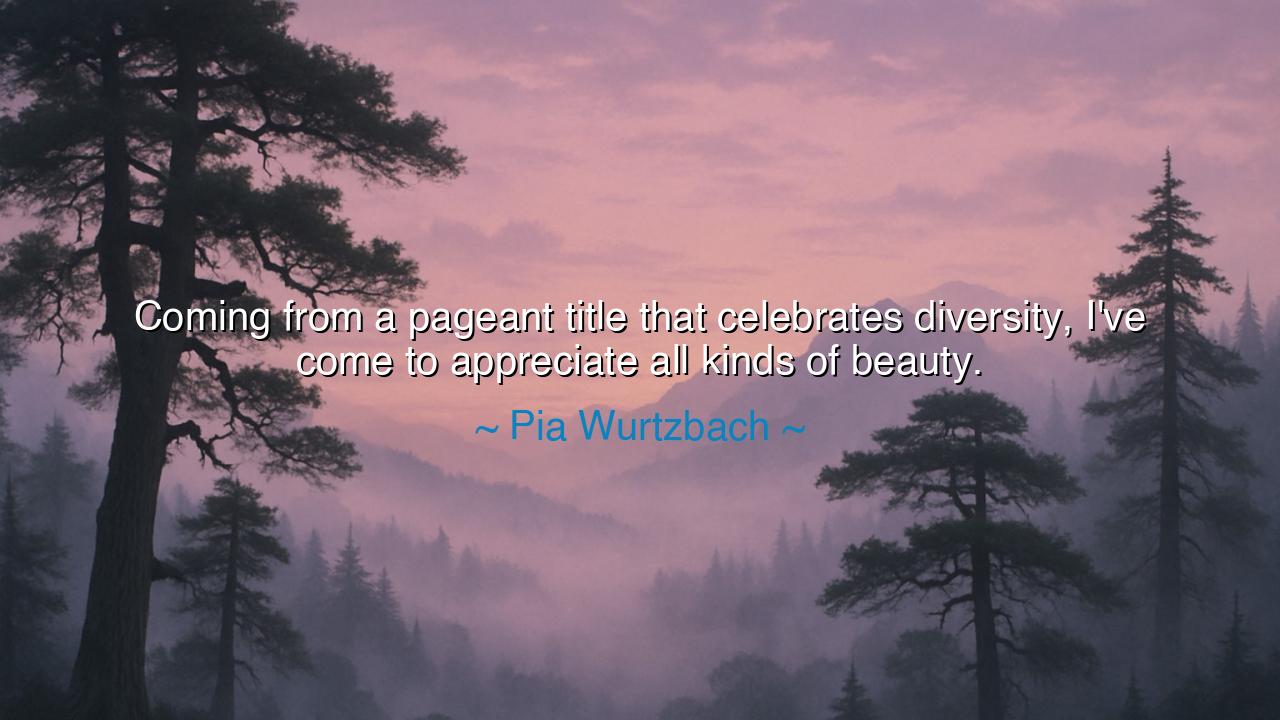
Coming from a pageant title that celebrates diversity, I've come
Coming from a pageant title that celebrates diversity, I've come to appreciate all kinds of beauty.






Host: The backstage dressing room still shimmered with the afterglow of the night. The mirrors were rimmed with tired lightbulbs, some flickering, some burnt out, their faint hum mingling with the soft rustle of gowns being packed away. The air was thick with perfume, powder, and the faint electric charge of fading applause.
Host: Jack sat slouched in a velvet chair, a half-empty glass of water beside him. His grey eyes wandered across the rows of makeup brushes and glimmering crowns, now stripped of their ceremony. Across the room, Jeeny stood before a mirror, wiping away the last traces of stage makeup, her reflection raw and human beneath the gloss.
Host: Between them, taped to the edge of the mirror, was a small printed quote from Pia Wurtzbach — crisp, unpretentious, but luminous with meaning:
“Coming from a pageant title that celebrates diversity, I've come to appreciate all kinds of beauty.”
Host: The words gleamed softly in the lamplight — a simple truth amid the shimmer.
Jack: “You know,” he said finally, voice rough with fatigue, “I’ve never understood pageants. The smiles, the glitter, the judgment. It all feels… shallow.”
Jeeny: “Maybe,” she said gently, not looking away from her reflection. “But maybe it’s not the crown that matters. Maybe it’s what you do once the lights are gone.”
Jack: “You sound like you’ve been there.”
Jeeny: “We’ve all been there,” she said, turning toward him. “The stage might look different, but everyone’s been judged by a room that doesn’t really see them.”
Host: Her words hung in the air like perfume — light, but lingering. Jack ran a hand through his hair, eyes narrowing.
Jack: “You think beauty contests can teach something about diversity? Seems ironic. The whole thing’s built on comparison.”
Jeeny: “That’s the old way of seeing it,” she said. “But beauty’s evolving. So are we. Pia wasn’t talking about competition — she was talking about recognition. Seeing beauty in difference, not despite it.”
Jack: “Recognition,” he repeated, the word thick with meaning. “That’s what we’re all starving for, isn’t it? To be seen — not through filters, not through rules, just… seen.”
Jeeny: “Exactly,” she said, smiling faintly. “That’s what diversity means. Not just skin or shape or color — but story. The kind of beauty that doesn’t need symmetry to make sense.”
Host: The room dimmed slightly as a technician turned off the overheads. Only the row of mirrors glowed now, each one holding fragments of reflections — versions of the people they’d pretended to be.
Jack: “You know,” he said softly, “when I look around this room, all I see are faces trying to prove they’re enough. It’s heartbreaking, really.”
Jeeny: “Maybe that’s why Pia’s words matter,” she said. “Because when you celebrate diversity, you stop trying to fit beauty into a box. You realize that perfection is the most boring story ever told.”
Host: She sat down across from him, pulling the pin from her hair. Her long dark hair fell loose, like a sigh of relief.
Jeeny: “Do you know what happens after every pageant?” she asked.
Jack: “Enlighten me.”
Jeeny: “The makeup comes off, the gowns go back in their cases, and everyone looks at themselves in the mirror and asks the same question: Who am I without the applause?”
Jack: “And?”
Jeeny: “That’s where real beauty begins,” she said. “When you stop needing the audience to remind you of it.”
Host: The silence that followed was soft — not empty, but full of quiet understanding.
Jack: “You think that’s possible? To really see yourself without the lens of others?”
Jeeny: “It’s hard,” she admitted. “But that’s what growth is — not learning to be prettier, but learning to be present. That’s what she meant when she said she’s learned to appreciate all kinds of beauty. You start with others — and eventually, you find it in yourself.”
Jack: “That sounds like therapy.”
Jeeny: “It is,” she said. “The soul’s kind.”
Host: Jack leaned back in his chair, exhaling. “You know, I once photographed a pageant,” he said. “Behind the stage, I saw women helping each other zip up dresses, fixing each other’s hair. It was the most human thing I’d ever seen — competition dissolving into care.”
Jeeny: “That’s beauty,” she said quietly. “Not the walk. The helping hands behind the curtain.”
Host: The lamplight flickered, catching her face — unadorned now, luminous not from makeup but from honesty.
Jeeny: “Pia understood something people often miss,” she said. “Diversity isn’t about showcasing difference. It’s about dissolving hierarchy. When you see beauty everywhere, you stop ranking it.”
Jack: “So, what you’re saying is — beauty isn’t visual.”
Jeeny: “It starts with vision,” she said. “But not the eyes’ kind — the heart’s.”
Host: Jack smiled faintly, his cynicism bending under the weight of her conviction.
Jack: “You know,” he said, “maybe that’s why the world keeps chasing beauty — because it’s the closest thing we have to grace.”
Jeeny: “Exactly,” she whispered. “And grace isn’t perfect. It’s generous.”
Host: The camera pulled back slowly. The dressing room glowed softly, mirrors reflecting countless variations of human faces — each one different, each one quietly magnificent.
Host: The words of Pia Wurtzbach shimmered faintly in the glass beside them, their truth undeniable:
“Coming from a pageant title that celebrates diversity, I've come to appreciate all kinds of beauty.”
Host: And as the lights faded, the final image lingered — two souls surrounded by mirrors, but no longer looking for reflection.
Host: Because real beauty isn’t found in the gaze of others — it’s found in the courage to see the divine in difference, the extraordinary in imperfection, and the sacred in yourself.






AAdministratorAdministrator
Welcome, honored guests. Please leave a comment, we will respond soon